“This Forced Them To Committ Suicide”, Civil Party Says about Forced Marriage
Today, September 19, 2016, Civil Party Sa Lai Heang was questioned about her marriage under the Khmer Rouge, treatment of the Vietnamese, as well as purges of cadres. She told the court that she was married in 1976 to a man she did not know. In contrast to other Civil Parties who had testified before this Chamber, her parents were present at the ceremony and festivities were held. She said, however, that some individuals who were forced into marriage were driven into suicide when threatened to consume their marriage. She also told the court that ethnic Vietnamese were “smashed” and that all cadres in her district disappeared and were replaced by cadres who came from the South.
Background of the Civil Party
All parties were present. The Civil Party 2-TCCP-251 was heard via audio-visual link. Sa Lai Heang was born on June 3, 1950. She lives in Pailin City.
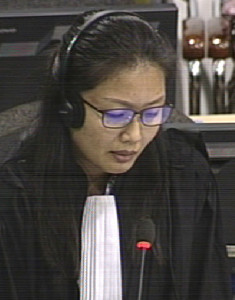
Civil Party Lawyer Ty Srinna
Civil Party Lawyer Ty Srinna started putting questions to the Civil Party. She wanted to know where the Civil Party lived before 1975. She replied that she joined the revolutionary movement in 1971 in Kantuot Commune in Kratie Province (Chet Borey District). Her siblings herded cattle and collected cow dung. When she joined the revolution, the Khmer Rouge were not in her village yet. “There was no proper organization. Some of us worked as messengers, but there was no particular unit that we belonged to”. She followed an appeal by people who “came from the jungle” to join the movement. Comrade Kong was stationed at the base and was a member of the sector committee. She was in Kratie Town before the liberation day of 17 April 1975. It was an assembly to send soldiers to reinforce the soldiers around Phnom Penh who engaged in the fight to liberate the city.
Marriage
She was arranged to get married in 1976. Her parents did not participate in the decision-making. Her supervisors, who were the committee of the sector, arranged the marriage instead. One of them was called Yi. This was in Sector 505 in the Northeast Zone. Yi was in charge of the economy. Before him, Yaem was in charge of the sector. “I had no right to refuse, I had to follow the order or arrangement by them, even though my supposed spouse was a blind or handicapped person, I had to follow them”.
She refused at first, but they “kept on asking, and they said that I was a stubborn person”. She then felt concerned about her own safety and agreed to accept the arrangement. Khoun was part of the sector committee. The sector committee conveyed the message to her through the commune committee. “They said: and now we arranged to get married for you”. “At the time, if we were stubborn, we would be accused of resisting them and not follow the party line or the order of the upper echelon. And that’s why I had to follow their order”. She refused several time before they called her a “stubborn person”. She also knew of other cases during which other people were asked to marry.
Between the meeting and her marriage, one month passed by. Both her parents and the other side’s parents participated. The couples had to make commitments to live together. After having made the commitment, “there was a party”. She did not know much about the conditions of other couples getting married, she said. “What I knew was that if people were matched, they had to get married”.
Ms. Srinna asked whether she was required to consummate their marriage and whether they were monitored. She answered that those who agreed with each other were not monitored, but those who “did not get along well” were constantly spied upon. They were reprimanded or re-educated. The Civil Party herself was not monitored, because she “remained silent”, although she did not get along well with her husband. If they opposed, they would be accused of “being a stubborn person”. She did not remember the exact words that were used to reprimand the people, but after these reprimands there were some people who committed suicide by taking poisonous medicine or drowned themselves. “The reason they committed suicide was that they were forced to marry”. They were threatened afterwards. “This forced them to commit suicide”. She did not witness the instance herself, but other people who heard about these incidents told her about it. Couples who got along well lived together briefly and were then separated. Her husband worked at the Public Transport Ministry, while she remained based at the village. Her husband was called San Chhoy, alias Chay. He was in charge of repairing bridges inside the sector.
She became pregnant around a year after the marriage. However, the child passed away. “Nothing serious happened to me during that period”, she said.
Arrest of her Husband
Her husband was arrested and she was accused of being linked to a traitor. “I was gathered to stay at one place to isolate from others, so nobody came to visit me. If people wanted to see me they had to secretly come”. At that time, she was with her young baby. There were other women and they were given one can of rice for one meal. “The situation was very difficult”. The two women had to take care of their children and her and other people’s children. Ms. Lai Heang had to pull weed and cut grass. Her husband was arrested in 1978 and she did not know the reason for his arrest. They used a pretext to arrest him. He was arrested at his unit while she was at the cooperative. A messenger came with a letter to call him for a study session. From that day onward he disappeared. After she tried to find out, she received information that he had been arrested. “It was speechless for me to lose him. Despite the fact that I did not love him, we lived together and provided warmth to each other. So I was in shock.” Her child attracted malaria and died. She cried quietly for the loss of her husband. “I did not want them to see me weeping and that I developed feelings for a traitor”.
At this point, the President adjourned the hearing for a break.
Presiding Judge Ya Sokhan ruled on a request by the Nuon Chea Defense Team to admit documents related to Robert Lemkin, such as transcripts of interviews and his written record of interview before the Supreme Court Chamber, as well as a Cambodia Daily Article of 18 June 2016. He announced that the Supreme Court Chamber transcript had already been admitted and the request was therefore moot in this regard. They admitted the excerpt of the transcripts of the witness who was believed to be 2-TCW-829 (Toit Thoeurn)[1]. The rest of the request was rejected in its entirety.
Mr. Ty Srinna returned to the topic of the arrest of her husband. She said that she did not know that her husband was “sent to death”, because she was told that he was sent to study. They waited for his return and tried to seek information when he did not return. A young boy who worked with her husband told her that he was arrested. The food given to them at the cooperative was not sufficient. “So hearing such news was another burden on my health. I became sick. I became skinny, and I did not have enough breast milk to feed my baby”. She confirmed that her husband was accused of being a traitor. “At that time, when something happened to a family member, the rest of the family was also accused of being connected to a tendency. As a result, they withdrew the confidence in us.” The monitored her and “they kept on looking at our words and our everyday life.” They placed her at a worksite in Snuol District in Kratie Province. “It was a worksite specifically assigned to wives of those who were accused of being traitors”.
Sent to a Worksite
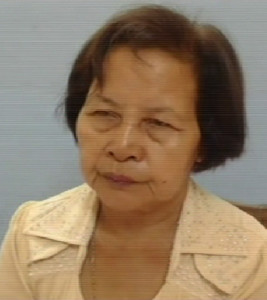
Civil Party Sa Lai Heang
As for the eating and living conditions, she said that they were “not allowed to go out anywhere”. Their food was also limited. They received one tin for six people. The worksite was located on a small hill and had been transformed into a pagoda by now. “We were not tortured, but the work conditions were a bit tough, because we were required to work both day and night time”. Three or four guards constantly monitored them.
There were more than thirty women at the worksite, including young and elderly ones. In 1976/1977, the leaders of Sector 505 were “all arrested”, she said. “They were all arrested from the senior level down to the commune level”. They were replaced by new leaders who were “so absolutist. They were so authoritarian”. They spoke with accents from Takeo Province. Those who had been removed were accused of “colluding with the yuon” or “sabotaging the revolution”.
There was no important meeting at the sector, she said. There were also meetings about the policy regarding targeting “future work”.
Ms. Srinna asked whether it was correct that her parents were allowed to participate in her marriage, because she was part of the revolution. There were connection problems and Ms. Srinna requested additional time for the time they had lost through this. The presiding judge Ya Sokhan informed her that they had already used 70 minutes.
Arrest of Vietnamese
She had heard of arrests of Vietnamese people. She said that she had lost family members: one of her Khmer uncles was married to a Vietnamese wife. Their children only spoke Khmer and not Vietnamese. “They were all collected and taken away. They were not spared, because they said that they were in some way connected to the Vietnamese”. Sa Kumny was a child of her uncle. From that family side, only one family survived. At this point, Ms. Srinna gave the floor to the Co-Prosecutors.
Representing the Co-Prosecution for the first time, Assistant Prosecutor Nisha Patel put questions to the Civil Party. Ms. Patel wanted to confirm what position Yi held at the sector level at the time that her marriage was arranged. She replied that he was chief of the sector when she got married. The instructions went down from the sector to the commune. They did not inform her in person about her marriage. She was verbally informed about the marriage. The mentioned the name of the sector committee and that it was an instruction from the “upper Angkar”. She said that this meant that the instructions came from the sector level.
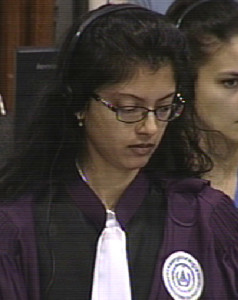
International Assistant Prosecutor Nisha Patel
Ms. Patel asked whether the sector committee was responsible for arranging all marriages at the time. She replied that they relayed orders to the district offices. She said that not every couple came from that level. However, the orders were related to the sector. It was always organized for their respective units.
Marriage Policies
Ms. Patel read an excerpt of her interview and asked whether it was correct that “for those who worked in the commune and the district level, the weddings were arranged by the sector level”. The Civil Party confirmed this. Ms. Nisha wanted to know whether she remembered any meetings that she attended which discussed CPK marriage policies. Ms. Guissé objected and Ms. Patel rephrased the question. She replied that marriages were not held according to traditions. “It became a pattern”.
Asked about a policy to increase the population, Ms. Lai Heang answered that their principle was to match people in a five to fifteen couple event. If they refused to get married, they would be accused of opposing the party line. “For that reason, we always had to obey the instructions”. As for those who did not get along well, she said that: “Sometimes they committed suicide in order to end the matter”.
Ms. Patel then wanted to know how she knew that those who did not agree to consummate were monitored. She replied that she knew whether they got along well by seeing whether they were able to look each other into the eyes. Asked whether she felt forced to consummate her marriage, Ms. Lai Heang said that “they had to monitor us” to see whether they got along after their marriage. She did not consummate her marriage, “because at that time we did not like one another”. They treated each other as friends when they slept next to each other. With this, Ms. Patel handed the floor to her colleague Seng Leang.
Arrests of Cadres
Mr. Leang asked her about Yi and Khuon. To her recollection, Yi – the sector committee – was called by Zone 304. After that call, he never returned. Khuon was in charge of military affairs and was arrested in Snuol District. “He was arrested when he was traveling in a jeep vehicle”. She stood along the road – at that time she was still pregnant – at around 9.30 am.
Mr. Leang presented a list of 171 S-21 prisoners. One of them was Born Nan, alias Yi and arrested on 21 March 1978, another one was San Bun Hi, alias Khuon[2] She knew about the arrests through other people. “The arrests took place successively” until all cadres had been arrested. The wives and children were sent away on a motorboat towards the direction of Kampong Cham or Phnom Penh area. She did not know where they were sent to exactly.
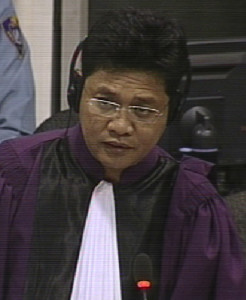
National Deputy Co-Prosecutor Seng Leang
At the worksite some people had two or three children. In total, there were around 20 women who had children and around 15 female youths.
Due to technical issues this morning, an extra five minutes were granted to the Co-Prosecution.
Mr. Leang wanted to know whether she had heard of the Khnong Security Center, which she confirmed. The road next to her worksite lead to this security center. At this point, the Khieu Samphan Defense Counsel objected and said that this security center was not in the scope of the trial. “I do not know why we should give him extra minutes about a security center that is not in the scope”. The objection was overruled. He read out an excerpt in which she had said that the prisoner’s bodies were cut open and their gallbladders eaten.[3] She said that this was correct. She had never gone there herself but she heard it from people who were released. “Yes, there were such incidents.”
At this point, the President adjourned the hearing for a break.
Wedding Ceremony
After the break, the floor was handed to the Nuon Chea Defense Team. Liv Sovanna inquired whether it was correct that she was born on June 3, 1950. She said that she joined the Khmer Rouge in 1970. Mr. Sovanna said that she had said this morning that she joined in 1971 and asked about her position at the time. She replied that she was the local committee at the time. It was at the commune level.
She could not recall the 12 Revolutionary Moral Principles. Mr. Sovanna quoted the sixth revolutionary principle, which stated that women should not be violated and that the couples and cooperatives had to consent to marriages.[4] She answered that she could not recall the principle. She held the position from 1972 until 1976.
She did participate in wedding arrangements. The selection of couples within the commune were organized regularly. During the arranged marriages, each couple was asked whether they agreed and “there was also a party”. If they disagreed to marry, there “would not be any serious problem” at the base. She said that they also asked their parents if they agreed. The parents often answered that “it depended on Angkar’s wisdom”. It was “okay” to arrange marriages for them if they all agreed. Sometimes parents on both sides had already matched couples since they were young. The parents proposed to the local chiefs to marrying the couple and the request was granted. No religious rituals were allowed during the ceremony, but “people secretly could conduct it”. If the Civil Party and other chiefs became aware of this, they chose to pretend not to see this. “Those people involved could do whatever they did. We did not interrupt their practice, we simply ignored it”. She herself refused three times. Each time that she refused it was a different man that she was matched with. At the time of her marriage, she was 25 years old she said.
Discrepancies
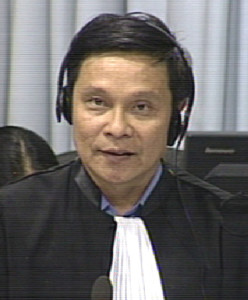
National Nuon Chea Defense Counsel Liv Sovanna
Mr. Sovanna read an answer by the Civil Party to the Co-Investigating Judges, in which she had said that she was only 18 years old and did not want to get married.[5] He asked how old she was and she repeated that she was 25. She was 18 years old when she joined the revolution. Everyone who participated in her wedding received cake. She had known her husband before. When couples were monitored, information was collected on what they were doing and saying. Some couples were called to be reprimanded.
Each unit had a supervisor who ordered the monitoring. “It was the same person who would order the couples to be reprimanded. The first time [they] would be educated, the second time [they] would be reprimanded”.
If the women did not “get along” and there was a female Angkar, or the supervisor of the woman, this person would mediate. “But there were no problems regarding that happening
in the villages and communes”.
With this, Mr. Sovanna gave the floor to his international colleague Doreen Chen. Ms. Chen asked about the attendance of her parents at the wedding. She did not visit her parents in the one month before her wedding. However, a commune committee informed them and invited them to attend the wedding.
Ms. Chen inquired when she was sent to the worksite at Samrong in Snuol District, Kratie. She stayed there or five to six months. The area was almost bombarded and they were evacuated to Orussei. “We were treated as depositees”. They had to “stay in” during day time and work at night time. There was a hospital nearby that treated the wounded soldiers that came from Snuol battlefield. The hospital was located to the east side of the road, while they were on the west side.
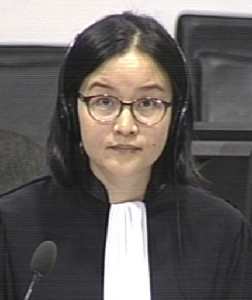
International Nuon Chea Defense Counsel Doreen Chen
Leadership of the Sector
The leader of the Northeast Zone was first a person called Yaem, with Yi being his deputy. Kuo took over later, and then Khorn. Another person was called Chaet. Yaem was assigned to be an ambassador in Korea and he was replaced by Yi. Khorn was sent for study session, so only Khuon and Yi remained. By 1978, the latter also disappeared. She did not know leaders at the zone levels. She once saw a person called Ya. “They said that he came from the zone level, although I did not know of his actual position”. He came to visit Thmei Commune. Someone mentioned that Sector 505 was managed independently. She said that “it was likely that it happened from 1974”.
Ms. Chen asked about the disappearance of cadres.[6] She confirmed that Tuch and Ya were said to have been sent to Zone 304. She said that she did not witness the arrests and only “heard people whispering about it”. They heard people in leadership positions talk about this. They did not say anything about reasons for their arrests. With this, Ms. Chen concluded her line of questioning.
Judge Jean-Marc Lavergne asked where the policy regarding the Vietnamese was initiated. She answered that it went down from the district level to the commune level. Those who were “half-blood Vietnamese” were to be smashed, since they were afraid that they would collude with Vietnam if Vietnam entered the country.
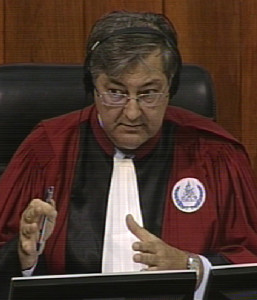
Judge Jean-Marc Lavergne
The word chum roeung meant, she said, to “do the screening” or to gather the census. Half-blooded Vietnamese people were killed, but some survived. As for the making of lists, it was done from the villages to the communes and from the communes to the districts, and from there higher up. There were mainly ethnic groups like Phnong and Kuy and no ethnic Vietnamese. They educated them at the commune. She therefore did not know much about the policy, she said. Based on the information she received from her relatives, some ethnic Vietnamese were smashed at the villages and others at security centers. Her aunt-in-law was an ethnic Vietnamese and held Cambodian citizenship. This was at the Security Center called Koh Sraka in Kratie District. She repeated that there were on ethnic Kuy and Phnong in her district.
At this point, the President adjourned the hearing for a break.
Commune Committee
After the break, Defense Counsel for Khieu Samphan Kong Sam Onn asked about the role as a commune committee. He said that she had said in her statement that she worked with the sector committee.[7] He wanted to know whether she worked at the sector level. She said that she was a member of the commune committee and not at the sector committee. She said that she worked with the sector committee when they came to work with the commune. She had to report to the upper level, that is the district’s women committee. She worked with Comrade Leang and worked with him. She worked at Thmei Commune later on. Mr. Sam Onn said that she had told the investigators that she stopped working in 1977, while she said today that she stopped working at the base in 1976. She replied that after they went onto a propaganda drive in 175 and 1976, the base committee no longer existed. They renamed it to Commune Branch. After this, she continued carrying out propaganda trips. In 1976 to 1977, the activities decreased and she was an ordinary member of the village and the commune, since the masses “understood about the movement”. By that time, communal meeting and cooperatives were put in place. She stopped working for the commune committee in 1977. “I no longer had the right to work there. That is after I was considered a useless person, and I became an ordinary member working in the cooperative”. Her husband lived in Prey Dek Office. She did not know about the situation regarding Vietnamese in other communes than Thmei Commune.
Vietnamese
The distance between where she lived and where her uncle lived was around 30 kilometers. She did not visit him during Democratic Kampuchea. She did not know his “political tendencies”, because he lived far away. She was told by a person that her uncle had disappeared and arrested. “I was shocked upon hearing that. My body shook”. She heard about this in 1977 a few months after his arrest.
She witnessed the transportation of Vietnamese on vehicle after 1975. This was at Kantuot Commune. She said that this was her native village and that she did not work there when she saw the Vietnamese transported. She said that it was perhaps in 1973. The floor was then handed to the international Khieu Samphan Defense Counsel. Ms. Guissé asked how often Ms. Lai Heang met with the district. She answered that she met them once every three months.
Ms. Guissé asked about the autonomy of Sector 505. She received this information from the Sector Committee.
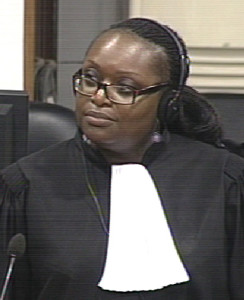
International Khieu Samphan Defense Counsel Anta Guissé
It happened after the liberation of Phnom Penh. There were conflicts with Vietnamese from 1976 onwards, she said. She did not know exactly anymore. It was before she was required to stop working, however. As for sending Vietnamese back to their countries, she had heard about this in 1972 or 1973. The killing of Vietnamese took place after the liberation of Phnom Penh. It was perhaps in early 1976, she said.
Ms. Guissé asked whether she was only aware of the situation in her own commune if she did not go to other communes. She said that she normally did not go anywhere and could therefore not grasp the situation outside her area. She mentioned Comrade Ruos, but he was not responsible for all communes. There were several communes in the district. She could not remember the names of the other people who were responsible for the rest of the communes in the district. “Later on they were taken away and killed”. For some families, only Vietnamese family members were taken away, and the Khmer family members remained. There were some people who were half-blooded Chinese. Ms. Guissé asked who gave her the information about the ethnic Vietnamese. She answered that when she conducted the census there were no ethnic Vietnamese.
Statement on Harm and Suffering
The presiding judge gave her the opportunity to make a statement on harm and suffering.
I was matched by Angkar to a man whom I did not like […] I was forced to marry the man that was not my choice and we had to agree with the arrangement by Angkar for our own safety […]. Otherwise we risked having problems with our safety. Personally, I constantly suffered. The husband whom was matched by Angkar was later on arrested and disappeared and I was accused of having the link to the traitors. And for that reason, my rights were removed and I became a civilian and later a depositee. […] I was not given sufficient food to eat and I was under constant monitoring by Angkar […] I had myself to work to reach the work plan imposed by Angkar. I did not have any right and I did not give proper time to rest. I could not provide comfort to my beloved child. As a result, my child’s health became weak and the body became emaciated. My child constantly was sick and the treatment was scarce […]. As a result, my child later died. [..] I hope my honors would find me justice, that is justice for me and justice for my family members who lost their lives during the regime, as well as justice for victims who suffered under the regime […] and may the court expedite the proceedings in finding justice for us.
Tomorrow, Tuesday, 19 September, 2016, Civil Party Mom Vun will conclude her testimony, after which 2-TCW-1031 will be heard in relation to security centers and internal purges.
[1] Toit Thoeurn testified on July 6, 2015.
[2] E3/10604; 150 and 151.
[3] E3/436, at answer 18.
[4] E3/765, at 00376493-94 (KH), 00539993 (FR), 0054024-25 (EN).
[5] E3/436, at answer 36.
[6] E3/436, at answer 22.
[7] E3/436, at 22.
Featured Image: Civil Party Sa Lai Heang (ECCC: Flickr).
